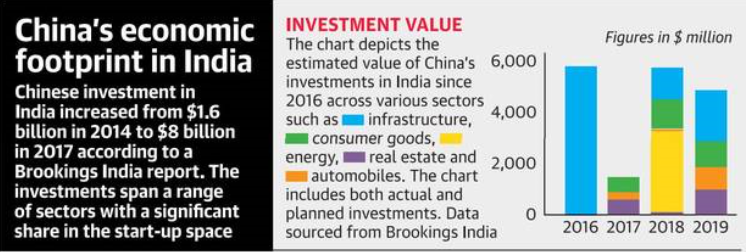New FDI Rule | 20 Apr 2020
Why in News
The Government of India has made its approval for Foreign Direct Investment (FDI) by neighbouring countries mandatory.
- This revised FDI policy aims to curb opportunistic takeovers/acquisitions of Indian companies due to the current Covid-19 pandemic.
Key Points
- FDI in India: FDI is allowed under two modes - either through the automatic route, for which companies don't need government approval, or through the government route, for which companies need a go-ahead from the centre.
- According to the new FDI policy:
- An entity of a country, which shares a land border with India or where the beneficial owner of an investment into India is situated in or is a citizen of any such country, can invest only under the Government route.
- A transfer of ownership in an FDI deal that benefits any country that shares a border with India will also need government approval.
- India shares land borders with Pakistan, Afghanistan, China, Nepal, Bhutan, Bangladesh and Myanmar.
- Investors from countries not covered by the new policy only have to inform the RBI after a transaction rather than asking for prior permission from the relevant government department.
- Impact
- The earlier FDI policy was limited to allowing only Bangladesh and Pakistan via the government route in all sectors. The revised rule has now brought companies from China under the government route filter.
- China's footprint in the Indian business space has been expanding rapidly, especially since 2014.
- Chinese investment in India
- The net Chinese investment in India, which was $1.6 billion in 2014, shot up five-folds to at least $8 billion (Rs 60,800 crore) in the next three years — with a noticeable shift from state-driven to market-driven investment from the Chinese private sector.
- Official figures underestimate the amount of investment: They neither account for all Chinese companies’ acquisitions of stakes in the technology sector nor investments from China routed through third-party countries, such as Singapore.
- For instance, a $ 504-million investment from the Singapore arm of the mobile firm Xiaomi would not figure in official statistics because of how investments are measured.
- It has been seen that the Chinese firms have escaped the kind of scrutiny in India that their investments have attracted in the West despite several high-profile investments and acquisitions.
- Another concern is that there is no clear separation between the Chinese state and private business. They work closely in pursuing many goals.
Foreign Direct Investment
- FDI is an investment from a party in one country into a business or corporation in another country with the intention of establishing a lasting interest.
- Lasting interest differentiates FDI from foreign portfolio investments, where investors passively hold securities from a foreign country.
- Foreign direct investment can be made by expanding one’s business into a foreign country or by becoming the owner of a company in another country.

